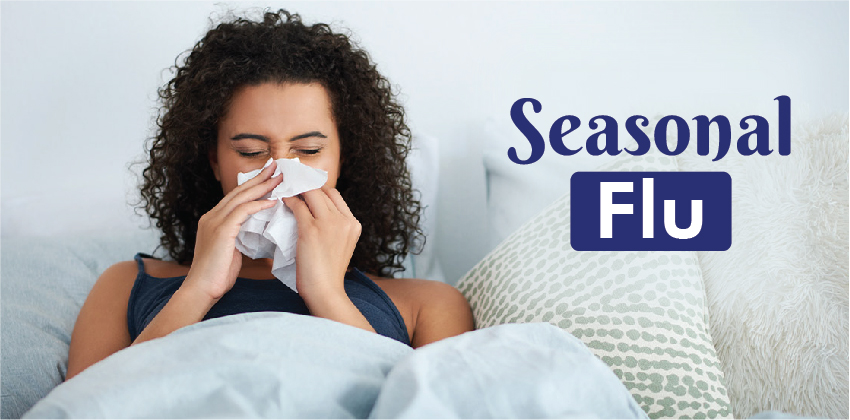Get a Clue, Fight the Flu

What is the flu?
Flu infection is also known as influenza. A broad spectrum of influenza viruses causes it. Different influenza virus strains are named starting with an A or B type (such as Influenza A H1N1 or Influenza A H3N2).
How does the flu spread?
These viruses are transmissible by respiratory droplets produced during coughing, talking, and sneezing.It is also transmissible by touching inanimate objects infected by viruses and touching the nose or eyes. It is a type of virus that can enter your nose, throat, and lungs and cause respiratory infection.
What are the symptoms of seasonal influenza?
Seasonal flu is usually characterized by sudden onset of fever,dry cough, headache, muscle and joint pain, sore throat, and runny nose. The cough can be severe and last for several weeks.
Who is more prone to influenza infection?
People of all ages are prone to this infection.
It is more precarious inimmunocompromised patients such as HIV AIDS.
Younger children less than five years and the elderly population with chronic illnesses such as diabetes, heart disease, asthma, kidney disease, or pregnancy.
How long can a person with the flu spread the virus to other people?
Most people spread before showing the symptoms from day 1 to 5-7 days after symptoms begin.
Is there any medicine for flu infection?
Most people with mild symptoms will recover automatically without prescription medicine.
General it is recommended to take rest and increase the intake of fluid.
Over-the-counter drugs such as pain killers, decongestants, cough suppressants, and expectorants may be prescribed for symptomatic treatment by your physician.
Yes, there is a prescription medicine called antiviral drugs that your doctor will decide whether to give or not.
What is the flu vaccine?
The flu vaccine is made from the killed virus strains, which are more likely to be active during the flu season.
The vaccine works 2-4 weeks after the vaccination by stimulating antibodies against the flu virus.
The virus that causes flu changes every year, so the vaccine is formulated to protect against the upcoming flu season.
So children less than five years and older people more than sixty-five years should receive it as soon as it is available in the market
There are various formulations available in the market:
For age 65 years and older, it is given intramuscular and intradermal for age 18-64 years.
If you are allergic to eggs or have any allergic history inform your healthcare provider before getting vaccinated.
What are the preventive measures to be taken during flu inflection?
While coughing sneezing, cover your mouth and nose with tissue and handkerchief.
Wash your handkerchief and hands at frequent intervals.
Stay at home for at least 24 hours after your temperature returns to normal.
Isolate yourself if possible or limit personal face-face contact with others.
Rest
Drink plenty of fluid, especially water.
Avoid Alcohol.
Stop smoking.
Eat food rich in nutrition throughout the day.
If you are a known case of chronic illness, fever persists for more than 4-5 days, symptoms worsening or shortness of breath or chest pain consult your physician
 Call For Appointment
Call For Appointment